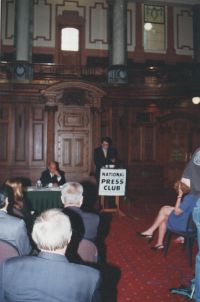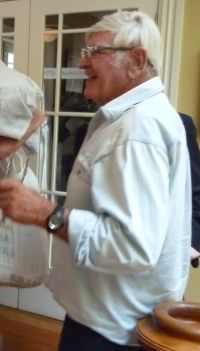 Tony Haas who has died after a long illness was an advocacy journalist whose mercantilist skills allowed him to pursue his central crusade which was the recognition of native Pacific cultures. This cause saw him zig-zagging the Pacific and at various times a working resident of many Pacific Islands and also of Japan and Singapore.
Tony Haas who has died after a long illness was an advocacy journalist whose mercantilist skills allowed him to pursue his central crusade which was the recognition of native Pacific cultures. This cause saw him zig-zagging the Pacific and at various times a working resident of many Pacific Islands and also of Japan and Singapore.
Haas managed throughout a half century working career to combine his triple passions of academic research, support for those he perceived as underdogs, and that of operating as an independent writer-publisher..
All these purposes from the outset converged on Oceania which became his central preoccupation in terms of journalistic coverage and in arranging practical assistance in his role as freelance aid promoter.
Anthony Roger Haas was born in 1944 into a recently-established Pahiatua farming family. His father having fled Germany just prior to the outbreak of World War 2. This provenance was to imbue Haas the younger with the sense of internationalism that was to become the leitmotif of his adult life.
Haas entered daily journalism from academia at a time when journalism was only beginning to make the transition from blue collar employment to a post-Watergate phase in which it became respectable and sought-after quasi professional career for the aspiring middle class.
Haas’ timing was fortuitous also in entering the craft before it became fashionable and thus competitive and therefore somewhat inhospitable to reporters departing from the assignment book and the institutional career path.
Haas throughout his own long career displayed though an ability that habitually eludes journalists from whatever background—the technique of turning contacts into enterprise partners, monetising them.
The National Press Club stalwart’s dedication to minority causes had begun as a student at Victoria University and it was here that he flourished as a student politician.
His ability to adapt to any collegiate environment was to become his hallmark even though poor eyesight was to rule out any sporting proficiency and thus deny him the gift outright of the varsity experience during its gilded era in the 1960s.
It was at Victoria University that he encountered Michael King. As flat mates they effectively divided Oceania between them.
Michael King became the defining popular author of the Maori experience while Haas in his own words took the “side road” into the Pacific islands.
Before his own untimely death Michael King urged Haas to produce a mirror of King’s own autobiographical testament, Being Pakeha. This eventually happened with the launch in 2015 of Tony Haas’ own long incubated 2015 autobiography Being Palangi – My Pacific Journey.
In his final full time employee daily newspaper job Haas took to heart the counsel of Wellington Evening Post editor Ken Poulton to the effect that he should cease the undergraduate life-style and acquire a house.
This Haas did, acquiring one of the very last inner city rambling bungalows which now became both residence and the headquarters for his diversified publishing operations.
A burly, jovially persuasive and indeed, forceful fellow, Haas was a natural as an entrepreneurial journalist selling advertising and indeed entire publication concepts to willing sponsors. His Decision Maker series became the defining glossies on the Pacific through the terminating decades of the last century.
Haas during these years garnered the goodwill of journalist contributors by always paying them regardless of the success or otherwise of the project.
He nimbly trod the path between the raffish milieu of reporters and that of the unctuously fawning sphere of public relations. He successfully presented himself as a researcher before this term too became tarnished by time and over-use.
To his fellow journalists, those in regular employment, Haas presented a somewhat Pasha like figure disappearing for months at a time to a property in the Marlborough Sounds, a rich hunting ground for the rarified and well-placed types that he so enjoyed weaving into his variegated publishing projects.
A natural organiser, Haas in these years also designed and participated in numerous voluntary forays into the Pacific for both cultural and for three-dimensional commercial aid projects.
His objectives were much aided by his ability as an event manager which in part took the form of throwing publication launch parties for contributors and sponsors alike.
In his later years Haas, a secular Jew, diverted some of his energies toward Europe and his own provenance. This was remarkable by any standards.
His grandfather was a member of the German Bundestag and as a determined opponent to the Nationalist Socialist, Nazi Party, is increasingly being viewed nowadays in Germany as the last politician who could have stopped World War 2.
In the event his grandfather told his son, Tony Haas’ father, to put as much distance as he possibly could between himself and Germany.
This the father did and acquired the family farm near Pahiatua shortly before the outbreak of the war.
It was here that Haas was born and grew up. Subsequently Haas always described himself as being at heart a farm boy.
When the internet ultimately undermined his publishing business it was to the Wairarapa Valley that Haas now returned for his final years which were spent on a leafy street in Greytown.
It was here that he instituted his final journalistic project in the form of a rural self help column in the community news sheet Grapevine.
He was much engaged in the resurgence in Germany of interest surrounding his grandfather and made one last excursion, this time to Karlsruhe, his ancestor’s old constituency.
As his final years slipped by Haas was much gratified to become actively involved in all details of the definitive book under preparation by a Berlin publisher on his illustrious ancestor Ludwig Haas who had once stood at the global hinge of fate.
Tony Haas is survived by his wife Dr Patricia Donnelly and their children.
















